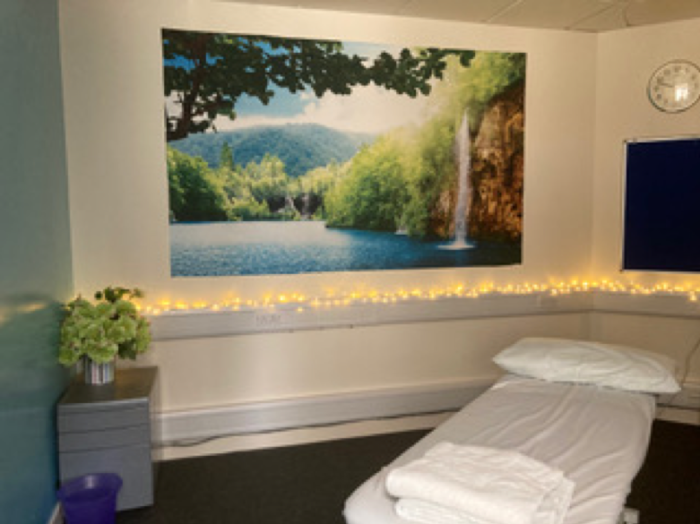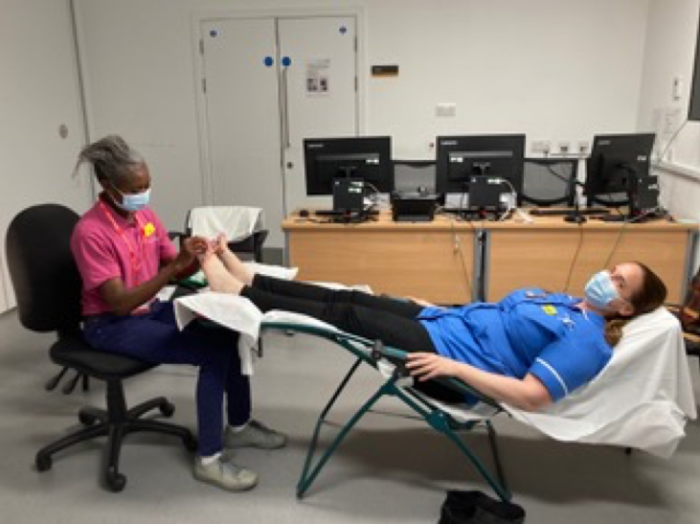Caring for the carers: a new complementary therapy service for NHS Staff
Amanda Tata reflects on her experience in bringing touch therapies to stressed NHS staff and actively changing their perceptions on self-care and the prioritisation of wellbeing.
Running a service offering massage, and other touch treatments to the NHS staff at a busy Central London teaching hospital has been a fascinating experience and I have learnt some fundamental ‘truths’.

For example, you would imagine that staff working in the healthcare industry would acknowledge their own wellbeing needs, but it is often the last thing they do. They have somehow been ‘programmed’ to prioritise caring for others whilst, for example, completely ignoring their shoulder pain or lower back pain (often triggered by being on their feet for 12-hour shifts). Often it is left until it’s too late and they have to take time off to recover. Clearly raising awareness in staff, and their managers, of the wellbeing and preventative benefits of complementary therapy are important goals for our service.

When I started, this service during the pandemic it was called a project. Now two and a half years later, the service is well-established. So much so that we have delivered over 3,000 massage treatments, all thanks to an amazing team of volunteer complementary therapists.
Staff can either book a 50-minute treatment using a booking app, in our UCLH Staff Spa or they can receive a shorter treatment in the workplace, which is often on the wards. The latter treatments are usually between 15 and 30 minutes long and don’t require a massage couch. As a massage therapist myself, who previously took massage to various workplaces and also volunteered in the hospital pre-Covid my job has offered an ideal and unexpected opportunity to expand the scope and application pf complementary therapy.
Trying to persuade staff that say they will never ‘find’ time for a massage, that they need to ‘make’ time has been challenging. When I wander regularly into the Intensive Care ward, trying to fill up a booking sheet for a 20-minute Indian Head massage, staff will all recognise me and have jokingly nicknamed me ’the massage bully’. Not least because I will not take ‘I’m OK’ as an answer when they turn down my initial offer of a massage.

The volunteer complementary therapists have also found it a really rewarding and very different job. Most have never worked with in a hospital or clinical environment and find the challenge very useful in expanding their skills and confidence in the delivering treatments in the workplace. They never know who is going to step through the door.
Many staff have never received any kind of touch therapy before and don’t know what to expect so it is important for the therapists to be well prepared in explaining and communicating about the therapy offered. Often, after their first massage experience, staff go back to the ward floating on a cloud, having discovered this extraordinary service. Word spreads and then a flurry of booking occurs from within their team colleagues. ‘They’ll have what she had!’
We offer a wide range of treatments, depending on what the volunteers can currently provide. This has resulted in staff discovering the benefits of something other than a deep tissue massage which is all many have ever heard of. Shiatsu, Craniosacral Therapy and Raynor Naturopathic massage as well as the more usual therapies are all being tried out by a curious staff. Such are the positive reviews and ratings on the booking app about such a wide range of treatments they will come and try anything offer, just as long as they can get a treatment on one of our well-equipped ’Spa’ rooms.
The main challenge, not surprisingly, remains finding new therapists who can offer three hours a week to the service for a minimum of six months. In return we offer an exciting opportunity to expand your repertoire and make a difference in the NHS, adding in the process this valuable experience to your CV.
Since the early days, demand has continued to grow as word spreads. Demand will always outstrip capacity but our mission is to get at least 50% of the 10,000+ NHS Trust staff to experience a massage treatment and to understand the benefits. Newly qualified therapists, older therapists, experienced therapists – we’re interested in all of you!
If you’d like to know more, please email me : amandaktata@nhs.net

Amanda Tata is an experienced massage therapist who runs a complementary therapy service for staff at University College London Hospital NHS Trust. She has been honoured by No. 10 Downing Street’s Points of Light programme for her work there.
Contacts
Email amandaktata@nhs.net